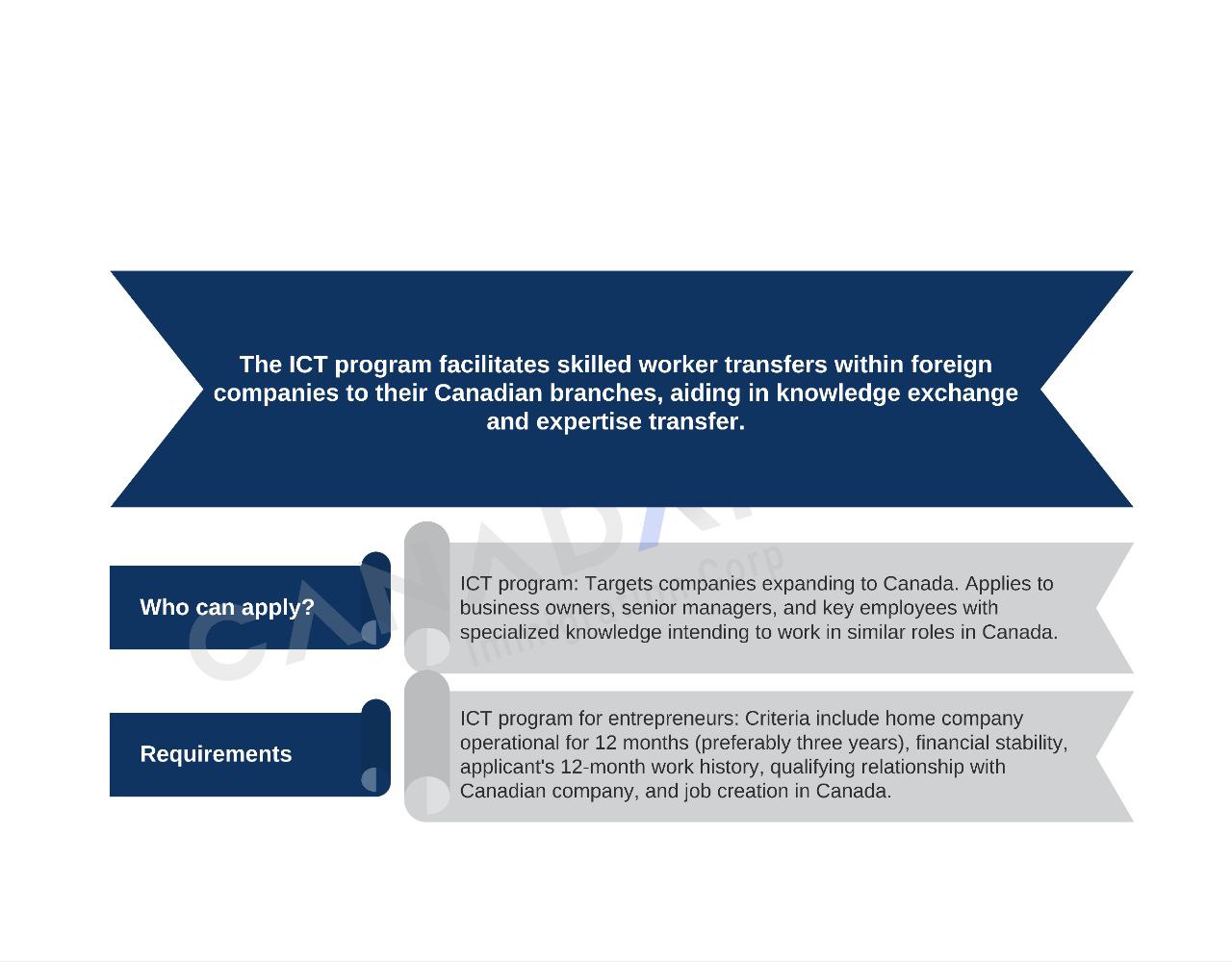Canada’s Intra-Company Transfer (ICT) program is an immigration pathway within the International Mobility Program (IMP) that allows multinational companies to transfer eligible employees to their Canadian branches, subsidiaries, or affiliates. This program facilitates the movement of skilled workers within the company, contributing to the transfer of expertise and knowledge.
This guide provides comprehensive information on the ICT program, covering:
- Eligibility requirements for applicants
- Application process details
- Duration of work permits granted through the program
- Associated costs involved in applying
Canada’s Intra-Company Transfer (ICT) Program
The Intra-Company Transfer (ICT) program is an immigration pathway within the International Mobility Program (IMP) that allows eligible foreign companies to transfer specific employees to their established Canadian branches, subsidiaries, or affiliates. This program facilitates the movement of skilled workers within the company, contributing to the transfer of expertise and knowledge.

Who can apply?
The ICT program targets established companies worldwide seeking to expand their operations to Canada. It applies to three categories of individuals:
- Business Owners, Entrepreneurs, and Shareholders: Currently holding executive positions in their successful companies and intending to perform similar roles in Canada.
- Senior and Functional Managers: Currently employed in a foreign company and planning to assume comparable positions in Canada.
- Key Employees with Specialized Knowledge: Possessing unique or uncommon advanced specialized knowledge.
Applicants in these categories must meet specific program requirements to obtain a work permit under the ICT program.
Requirements
Entrepreneurs seeking to expand their business to Canada through the ICT program need to fulfill specific criteria, including:
- The home company must have been operational for at least 12 months (preferably three years) before expanding to Canada.
- The home company must demonstrate financial stability to support foreign operations in Canada.
- The applicant must have worked with the home company for at least 12 months in the past three years.
- The home company and the Canadian company must have a qualifying relationship (parent, subsidiary, or affiliate).
- Canadian operations must be a viable enterprise leading to job creation for Canadians.
For initial expansions, officers assess factors such as a sound business plan, potential job creation for Canadians, and the necessity of an executive or manager in Canada. First-time applicants must present a compelling business case and rationale for expansion and meet essential ICT eligibility criteria.
Required Documents
The following is a list of documents commonly required for an ICT program application. Specific requirements may vary, and applicants should always refer to the latest guidelines from the Canadian immigration authorities.
Overseas Entity Documents:
- Company registration documents
- Shareholder certificates or records
- Business licenses (if applicable)
- Tax registration documents
- Audited or non-audited financial statements (past 2 years)
- Business bank statements
- Profit and loss statements (if applicable)
- Balance sheets (if applicable)
Canadian Entity Documents:
- Certificate of incorporation (if applicable)
- Articles of incorporation (if applicable)
- Shareholder certificates or records (if applicable)
- Notice of change forms (if applicable)
- Amendments to incorporations (if applicable)
- List of directors or amendments (if applicable)
- CRA Business Number (if applicable)
- LMIA exemption explanation (if applicable)
ICT Applicant Documents:
- Passport
- Marriage certificate (if applicable)
- Resume
- Education certificates (Educational Credentials Assessment (ECA) not required)
- Digital photo
- Personal bank statements (for at least six months)
- Pay stubs or proof of employment with overseas company
- Net worth certificate (if applicable)
- Proof of ties to home country (if applicable)
- Offer of employment from a Canadian company
- Employment contract (if applicable) from Canadian company
- Letter from current employer (from overseas business)
- Completed immigration forms
- Police clearance certificate (in some cases)
- Upfront medical examination (in some cases)
Costs and Duration
The cost of the ICT program can be divided into two categories: government fees and service provider fees.
Government Fees:
- Work Permit Fee: CAD $155
- Biometrics Fee: CAD $85
- Employer Compliance Fee: CAD $230
Canadian Entity Setup (if applicable):
- Canadian Entity Incorporation: CAD $1,500 – $2,500
Service Provider Fees (vary based on provider):
- Business Plan Development: CAD $2,000 – $10,000
- Immigration Application Preparation and Advisory Services: CAD $7,000 – $25,000
It is important to note that these are estimates and actual costs may vary.
Duration:
The duration of an ICT work permit depends on the employee’s category:
- Executives and Senior Managers: Up to 3 years initially, with extensions possible for a maximum of 7 years.
- Functional Managers: Up to 3 years initially, with extensions possible for a maximum of 5 years.
- Employees with Specialized Knowledge: Up to 3 years initially, with extensions possible for a maximum of 5 years.
This framework allows flexibility for various roles while adhering to specific timeframes for each category.
Conclusion
The ICT program offers a streamlined path for multinational companies to transfer key personnel to Canada. With varying durations based on roles, the program provides a flexible and efficient immigration process for eligible individuals.








